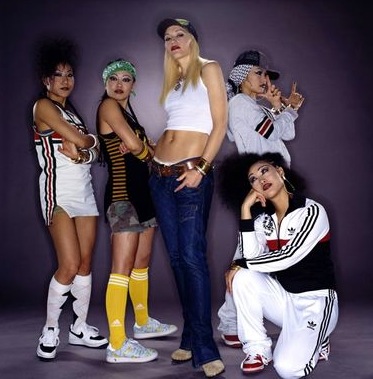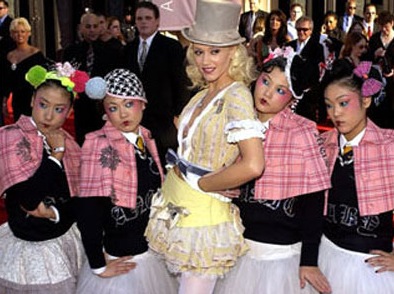Gwen Stefani
27/08/14 09:12

In this context, Gwen Stefani deserves her own post. As background to these videos, a good place to begin is "English as a Second Language" by Anne Ishii in the Village Voice. Ishii compares Gwen's "harajuku girls" with the geisha played by Zhang Ziyi in "Memoirs of a Geisha" -- or "Sayuri" as it was released in Japan.
... "But even if God's wrath upon the Asian denizens of Babel is broken Engrish, at least it's not total silence. The Harajuku Girls are a quartet of dancers (at least one of whom is from California) on Gwen Stefani's solo music tour. They pose as avatars of the Tokyo neighborhood famous for being a spectacle of fashion and consumerism. Rumor has it that they were contractually obliged by Gwen Stefani (or her PR gurus) not to speak English while on tour, despite being fluent in the language. Love, Angel, Music, and Baby are, like the geishas in Memoirs, simply empty roles of Asian women who aren't allowed to speak openly. I hope that there is no doubt, but just to be clear, silencing people is the epitome of taking away their autonomy and subjectivity, even if Gwen Stefani thinks her silent Japanese fashionistas are part of an awesome and empowering counterculture. This raises the question: Why would an American entertainer who presumably knows cultural diversity (Stefani hails from a part of the O.C. not 10 minutes from my own provenance, where— unlike in the TV show—close to half the population is nonwhite) make such stupid demands specifically for Asian roles? What would be so wrong with Asian women speaking normally?"...
Margaret Cho had a fantastic short piece reacting to the Harajuku girls on her blog but it seem to have been removed. I'll do what I can to find the original, but for now here's a choice quote:
"I want to like [the Harajuku girls], and I want to think they are great, but I am not sure if I can. I mean, racial stereotypes are really cute sometimes, and I don't want to bum everyone out by pointing out the minstrel show. I think it is totally acceptable to enjoy the Harajuku girls, because there are not that many other Asian people out there in the media really, so we have to take whatever we can get. Amos 'n Andy had lots of fans, didn't they? At least it is a measure of visibility, which is much better than invisibility. I am so sick of not existing, that I would settle for following any white person around with an umbrella just so I could say I was there."
An interviewer for Entertainment Weekly asked Gwen Stefani specifically about Margaret Cho's piece -- and she was surely not the only one to write and think along these lines. Gwen seems to completely miss the point that it is quite possible to think that Japanese culture, and even Japanese people, are fun and still turn them into, to use Cho's evocative phrasing, "a silent minstrel show."
Gwen says:
''She didn't do her research!'' spits Stefani, who says she's been a fan of Japan and its mix-and-match fashion sense since first visiting the country with No Doubt in the mid-'90s. ''The truth is that I basically was saying how great that culture is. It pisses me off that [Cho] would not do the research and then talk out like that. It's just so embarrassing for her. The Harajuku Girls is an art project. It's fun!''
In the same article, the author included Cho's reaction to this quote, which is perhaps the best sarcasm I've read in a long time:
Cho responded via e-mail, ''I absolutely agree! I didn't do any research! I realize the Harajuku Girls rule!!! How embarrassing for me!!! I was just jealous that I didn't get to be one -- I dance really good!!!''

A few videos for your consideration -- with her the Japan doesn't end at a quick name-drop, either:

"Hollaback Girl" (2004). Apparently, the camera she uses at the opening of the video was sold as a limited edition "Harajuku Lovers" version by HP. Incidentally, what she says to the four women is "super cawaii" -- "cawaii" meaning "cute" in Japanese.
"Rich Girl" (2005) -- where the women start as girls playing with dolls
"Wind it Up" (2005) -- where the newly blond "Harajuku girls" seem to have become dolls themselves
Gwen's HP commercial, seemingly shot in Japan (2005)
Sweet Escape (2006) -- with Akon and only two of the "Harajuku girls," though four return in the following live performance of the same song.
Finally, this is live performance where the "girls" have been choreographed to, again, look like dolls and also seem to be worshiping Gwen, particularly at the beginning.

